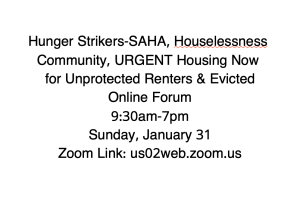
‘When you’re homeless, you don’t have the energy to protest.’ What to do when traditional forms of protest have become ‘white noise’ for elected leaders?
Marisol Cortez

In 2016, a year after the last residents were forced out of Mission Trails Mobile Home Community, a small group of supporters and I attempted to present to the city’s Housing Commission, newly formed to develop policies to prevent further mass displacement, preliminary findings from in-depth interviews we had conducted with displaced Mission Trails residents. Surely their experiences and suggestions would be valuable to the Commission’s efforts to develop effective anti-displacement policy, we thought.
In almost torturous fashion, the City twisted and turned midair like Keanu Reeves in The Matrix to block our efforts at every move. No, we couldn’t confirm in person that a discussion of our findings would be placed on the agenda of an upcoming meeting. Nor could we email commission members to make this request directly, since their email addresses were not public. Nor could we trust that an email request sent to city staff, who kept the email list of commission members, would be forwarded.
Eventually, after much unnecessary escalation on both sides, the Commission allowed 15 minutes at one meeting to present our findings, which were never spoken of again in any public meeting.
The message couldn’t have been clearer: even as they formulated policy intended to prevent future displacement, the City really didn’t want to hear from displaced people themselves, even when it was mediated and presented academically.
After a while I gave up. Well, I didn’t give up. But I was done trying to convince city people of anything. I couldn’t stand expending any more of my limited energy and wellbeing on purportedly public meetings with no meaningful route for public input, public input that in taking lived expertise seriously would greatly improve policy. I didn’t give up, but I washed my hands of the city people and moved on to other modes of political engagement.
Meanwhile, many good folks continued to fight city hall. Molly Wright, housing justice activist, is one of them. On January 21, she embarked on a hunger strike to call attention to the city’s inadequate response to San Antonio’s exploding crises of homelessness and housing insecurity, underway even before COVID hit.
Wright felt compelled to act because—just as we did after Mission Trails—she had already presented them with many creative policy proposals for meeting the needs of those living unsheltered, based on her experience as a formerly homeless person. None of these have been heeded, much less implemented, she said.
A year ago, she met with Mayor Ron Nirenberg to propose a Safe Parking Lot Program, a potential partnership between City of San Antonio, VIA Metropolitan Transit, and Bexar County that would provide open and well-lit spaces around the city where people living in their cars might park overnight. She also proposed extending sanitation services to encampments rather than relying on San Antonio Police Department sweeps, and opening truck stop-style day shelters where people might access showers, laundry, and service providers. After initial support, these proposals were directed to COSA’s Department of Human Services, where they lay dormant as the City contracted with consultants to further study the issue.
For Wright, this death-by-assessment has yielded an unacceptable inaction given the urgency and scope of the crisis, sure to worsen with the expiration (now extended to March 31) of local and federal eviction moratoria. And so she resolved to begin a hunger strike, a form of protest not seen in San Antonio since 2010, when undocumented and allied college students began a hunger strike to pressure then-Senator Kay Bailey Hutchison to sign onto the DREAM Act. Now as then, the rationale is that nothing else has worked—not protests, not meetings with elected officials, not policy proposals “delivered on a silver plate,” not public comments.
“Protest has become so much white noise to the city,” said Wright. “Report that this is what it’s come to.”
But hunger, and thus food refusal, also has a powerful symbolism within the experience of homelessness. “When you’re homeless,” she said, “you don’t have the energy to protest.” Hunger is desperation. Hunger is utter frustration, banging your head against a door that refuses to open, screaming one’s needs in the face of one who is sympathetic but ultimately unmoved.
Hunger is the violence of unaccountable forms of policy made visceral and public and ugly. The spectacular, self-inflicted violence of food refusal reveals the invisible and banal forms of violence that more systemic denials routinely inflict on the poorest.
According to press materials sent out by Wright, her hunger strike will continue until the City makes key policy changes, including:
- An end to encampment sweeps that unlawfully evict people living in tents;
- Immediate implementation of D1 Councilman Treviño’s Dellview Pilot Program;
- Extension of COSA sanitation services (trash pick-up) to people living in tent encampments;
- Development of immediate alternatives for unsheltered people, beyond Haven for Hope, such as a Safe Parking Lot Program and housing for the shelterless in hotels and vacant buildings;
- Democratizing selection of the next San Antonio Housing Authority CEO by having tenants engage in the hiring process and ultimately vote on candidates.
But hunger can be more than desperation. As with César Chávez or Mohandas K. Gandhi, hunger can also be the discipline that motivates and mobilizes others to join mass movement. To that end, here are two ways to support Molly:
First, sign this petition in support of Wright, titled “Housing is a Human Right.”
Second, join an online solidarity action this Sunday, January 31 from 9:30 a.m. to 7 p.m. CST.
Full Agenda
9:30am–10am
Just Molly, Community Housing Activist
10:30am–10:45am
Evictions, by John Oliver
10:45am(ish)-11:00am(ish)
On work preserving legacy homeownership by Rebecca Flores More Revolutionary Music Tunes and Videos After Discussions
11:30am-12pm
Cancel the M’Fing Rents, a background on how housing was pre-pandemic and how Covid has devastated housing even more now. PSL-SATX Jake Tucker
Noon-1pm
SAHA WORLD Vouchers and NHSD Emergencies
1pm
SAHA Tenant, Evon Lafabre
2pm-3pm
Councilman Roberto Trevino offering his full support and a conversation on ways we can make all demands happen. Brainstorming session.
3pm-4pm
On Housing Authorities, Teri Castillo, D5 Candidate City Council.
4pm
SAHA Update, Kayla Miranda, Expert Opinion, Houseless Society of SA
4:30pm–5pm – Mobile Homes, by John Oliver
5pm–5:30pm EHAP How it went from Ideal to Surreal, Maureen Lydon Galindo, Housing Activist & Jessica Guerrero, Madame Housing Commissioner
Like What You’re Seeing? Become a patron for as little as $1 per month. Sign up for our newsletter (for nothing!). Subscribe to our podcast at iTunes or Sticher. Share this story with others.
